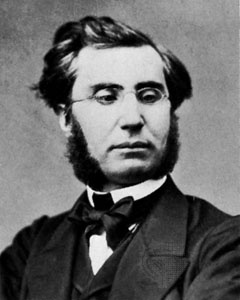Ollivier, Émile
French statesman
Ollivier also spelled Olivier
born July 2, 1825, Marseille, France
died Aug. 20, 1913, Saint-Gervais-les-Bains
 French statesman, writer, and orator who, as minister of justice under Napoleon III, authored an abortive plan for achieving a governmental compromise between Napoleonic autocracy and parliamentary democracy.
French statesman, writer, and orator who, as minister of justice under Napoleon III, authored an abortive plan for achieving a governmental compromise between Napoleonic autocracy and parliamentary democracy.Trained in the law and, in his early life, an adherent of the socialist and Romantic movements, Ollivier was appointed commissioner-general of the Bouches-du-Rhône département at the outbreak of the Revolution of 1848. When Louis-Napoléon became president of the republic (December 1848), Ollivier was dismissed from his post and from 1849 to 1857 held no public office. During this time he abandoned his socialist activities and concentrated on his law practice.
Elected to the Legislative Assembly in 1857, Ollivier became one of the republican minority known as “the Five,” which viewed Napoleon's regime with hostility. But when the emperor made liberal concessions in November 1860, Ollivier offered his support to him if Napoleon would establish representative government. Ollivier soon broke with the republicans and began working with the Duke de Mornay for a “liberal empire” that would incorporate elements of parliamentary government.
On Jan. 2, 1870, Napoleon appointed Ollivier minister of justice at the head of a government chosen from the leaders of a majority in parliament. Ollivier drew up a new constitution that was approved in a plebiscite by nearly 70 percent of the voters, and he set up numerous commissions to prepare the complete reform of such areas as labour, education, and law. He seemed to have transformed the Second Empire from despotism to constitutional monarchy without bloodshed or violence.
Ollivier's work was ruined by the outbreak of the Franco-German War little more than six months after he came to power. He had no desire for war, but he allowed the control of events to slip out of his hands, so that when the Prussian chancellor Otto von Bismarck's Ems telegram was published Ollivier considered it an intolerable insult to France and declared war on Prussia (July 19, 1870). The French military reverses soon obliged him to resign, which he did on Aug. 9, 1870, and he never returned to politics.
During the remaining 43 years of his life, Ollivier cultivated his wide interests and varied talents. At 65 he wrote L'Empire libéral (“The Liberal Empire”), partly a history of the Second Empire and partly memoirs. This monumental work of 17 volumes is historically valuable as a contemporary defense of Napoleon III. From 1870 he was a member of the French Academy.
- plutonium
- Plutus
- Plymouth
- Plymouth Brethren
- Plymouth porcelain
- Plynlimon
- Plzeň
- Plácido Domingo
- Pléiade, La
- Plücker, Julius
- pneumatic device
- pneumatism
- Pneumatomachian
- pneumococcus
- pneumoconiosis
- pneumonia
- pneumothorax
- p-n junction
- po
- Poaceae
- poacher
- poaching
- Poales
- Pobedonostsev, Konstantin Petrovich
- Pocahontas